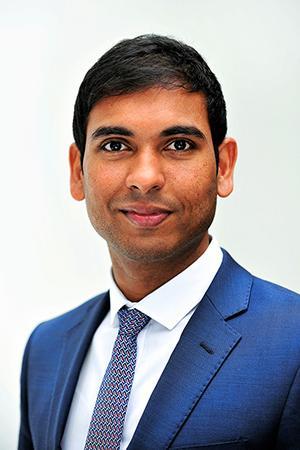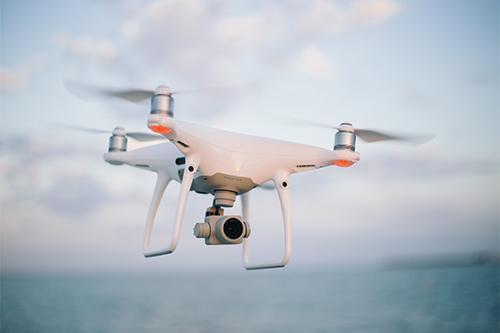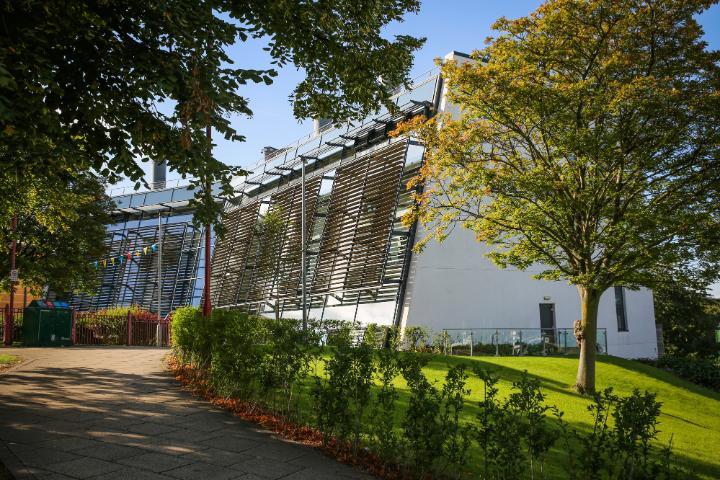Drone swarms and a quantum computing revolution - The world of agri-tech
Ethical considerations will play a major role in the next technological leap, says Bradford professor. As a child, Professor Sankar Sivarajah remembers watching his older brothers build computers from scratch. Born in 1986, he grew up in Sri Lanka in the midst of the country’s civil war (1983-2009) and recalls moving from the north to live closer to the capital, Colombo, when he was about three.
If his love of technology stemmed from his three elder brothers (he also has an older sister), then his passion for business came from his father, Sivarajah Thambiaiah, a local spice and commodities wholesale trader with entrepreneurial tendencies, having since expanded into budget lodging. If you’ve ever used cinnamon - given 90 per cent of the world’s supply emanates from Sri Lanka – the chances are that at some point, it’s been traded by his father.
Known as Sankar to friends and colleagues - a contraction of Uthayasankar, which he says he shortened “so people wouldn’t struggle pronouncing my lengthy Sri Lankan name” - he has fond memories of growing up and says he hadn’t planned to enter academia. He turned 34 in May 2020 but earned his professorship over a year earlier, making him among the youngest in the UK to hold such a position – a real privilege and honour which comes with great social responsibilities.
Now he is Head of the School of Management and Professor of Technology Management and Circular Economy.

If you had told me when I was younger that I would become a professor, I would have laughed at you. I was always business-minded with a love for technology.
I remember watching my brothers build computers as a youngster and I always wanted to start my own business. I was never a star student at school and wasn’t in the top league in terms of grades but one thing I was always passionate about was business. I always did better in business and computing. It was a gut feeling to follow that through into higher education, but teaching was never something I set out to do. Even when I completed university, the plan was to come back and help my father with his business.”
He moved to the UK to complete his higher education in 2004, gaining a First-Class BSc (Hons) in Business and Management specialising in Computer Sciences from Brunel University London. After that, he gained an MSc with Distinction in Management, specialising in Entrepreneurship from Cass Business School, City University London. He was also recognised and awarded by Cass an honorary membership to the Beta Gamma Sigma Society, an international honour society recognizing business excellence. It was at that point, poised to return to his homeland, he received an offer from Brunel for a fully funded Graduate Research Assistant scholarship to further his research into how local governments employed emerging social media and technology platforms. It was a turning point in his career.

“Even though I had the offer, my instinct was to return to Sri Lanka,” he recalls. “So, they said I could take some time to think about it. My father still half jokes about me coming back to work with him but when I went home, my mother urged me to take up the place at Brunel. It was such a rare offer.”
And so he did. His work saw him focus on digital government research and encompassed analysis of how the public sector was implementing emerging technology, some of it funded by the European Commission. He was awarded a PhD in 2014 in Management Information Systems.
“That really caught my eye. It was an environment where you could design, test and pilot your ideas which could have potential social benefits and impact. That dragged me towards working in academia and I became a lecturer.”
After his time at Brunel, he took up a position at the University of Bradford in December 2017. Now his research is focused on circular economy and the responsible use of disruptive technologies such as AI and blockchain by businesses and organisations.
He actively publishes in leading high impact factor journals such as Journal of Business Research, Computers in Human Behaviour and Government Information Quarterly. His research has also been featured in reputable media/trade outlets such as BBC, Computer Weekly, Public Sector Focus and London School of Economics’ academic blog.
“I’m passionate about tech being used for social good. That comes from my childhood. In a way, I had an accidental route into academia. You could say it’s a lesson in following your passions. I enjoy research and sharing the findings. While I always wanted to start my own business, I look at this as a way of doing that in a different way, through education. I now have the humble opportunity to develop future responsible business leaders.”
Among other things, he says humanity is on the verge of a Copernican Shift when it comes to computing, while agriculture could be transformed by swarms of AI drones and he’s keen that such breakthroughs have a strong moral foundation.
“We are in the infant stage of getting used to AI. It was always there before, even 50 years ago we were using algorithms, but the amount of data was not as much as today. If you wanted to use algorithms to predict things, it had to be based on historical data.
“Given the data sets we have now and the fact that in the next five to ten years we might see a revolution in computational power through quantum computing".

It’s no longer a question of what we can do with it, it’s about how can we use technology safely, respectfully and ethically in its implementation.
“For me, when you analyse something, it’s about seeing the good, the bad and the ugly. Only when you see all of that can you use technology responsibly. The A-level/GCSE exams algorithm fiasco last year is a prime example.”
“Technology therefore needs to be used in a responsible manner such a way that it does not lead to unethical applications, misuse or exclude those who are not familiar with it. It needs monitoring by a diverse set of people".
“At the moment, we are attempting to operate in a Covid-ready world, so things like smart office systems, face recognition, temperature checks and working from home are going to be more prevalent.”
Another area which is likely to see imminent change is agriculture and agri-tech. Sankar has already worked with colleagues on a concept of ‘drone swarms’, airborne AI units capable of quickly gathering masses of information about crops, soil temperature, moisture levels, the use of pesticides and so on, which have the potential to transform farming, increase yields and make production more efficient. The paper was published in Production Planning and Control Journal entitled: Artificial intelligence and food security: swarm intelligence of agri-tech drones for smart agri-food operations.
“It has applications in places where there is a need for farmers to explore vast areas of inaccessible land. We have conceptualised the idea and the next step is to simulate and test the real thing. Agri-tech and food security is a huge area, both in the UK and abroad. As AI grows, this will become much more important.
“Technology is an enabler. It can be good or bad, so it’s important to use it in the right way and for the betterment of society.”
As Professor of Technology Management and Circular Economy, he is currently the Head of School of Management and the Head of Business Analytics, Circular Economy and Supply Chain Research Centre. He is a Fellow of the UK Higher Education Academy, a member of the British Academy of Management and Association for Information Systems. To date, he has been involved as Principal and Co-investigator in over £3 million worth of research and innovation and consultancy projects, funded by national and international funding bodies and commercial organisations.
His passion for his chosen field is summed up by the fact he commutes to Bradford for work every week from his home in Buckinghamshire, where he lives with his wife, a GP.

If I wasn’t excited about it, I wouldn’t get out of bed. I came here for the people, the culture and the values that Bradford holds. I treasure the opportunities that the Bradford community has to offer and the diversity which drives that. If you want to go get it and do it, no-one is telling you not to. A positive and can-do attitude is what you need leaving the negativity behind and seeing challenges as opportunities rather than hurdles certainly helps.
